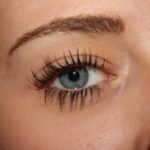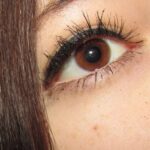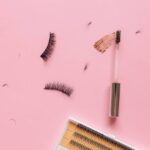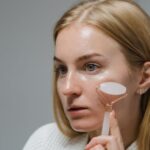Experiencing lash fall can be concerning, but understanding the potential causes and implementing preventive measures can help maintain healthy, strong lashes. Addressing poor makeup habits, using nourishing lash serums, managing stress, and seeking medical advice when needed are some of the strategies to prevent and treat lash fall.

If you’ve noticed that your lashes are falling out more than usual, it’s natural to be concerned. Lash fall can be caused by various factors, including natural growth cycles, poor makeup habits, and medical conditions. In this article, we will explore the possible reasons why your lashes are falling out and provide tips on how to prevent and treat the problem.
The Reasons Why Your Lashes Are Falling Out
Understanding the Natural Lash Growth Cycle
Lashes, like the hair on your scalp, go through a natural growth cycle. This cycle consists of three phases: the anagen (growth) phase, the catagen (transition) phase, and the telogen (resting) phase. At the end of the telogen phase, lashes naturally fall out to make way for new growth. On average, you lose 1-5 lashes per day as part of this cycle. It’s important to remember that some lash fall is normal and not a cause for concern.
Poor Makeup and Cleansing Habits
One of the most common reasons for excessive lash fall is improper makeup application and removal. Using expired or poor-quality makeup products, applying mascara too aggressively, sleeping with mascara on, or rubbing your eyes during makeup removal can weaken your lashes and cause them to fall out prematurely. To prevent this, be gentle when applying and removing makeup and use high-quality, non-irritating products.
The Impact of Lash Extensions and False Lashes
Frequent use of lash extensions or false lashes can also contribute to lash fall. The adhesive used to attach these lashes can weaken your natural lashes, and the added weight can put stress on the hair follicles, causing them to fall out. To minimize this risk, take breaks from using lash extensions and false lashes, and opt for a professional application to ensure proper technique.
Medical Conditions Affecting Lash Health
Certain medical conditions can cause lash fall, including:
- Blepharitis: Inflammation of the eyelids, often caused by bacterial infections or skin conditions like rosacea.
- Thyroid disorders: Both hypothyroidism and hyperthyroidism can lead to hair loss, including lashes.
- Alopecia areata: An autoimmune disorder that causes hair loss in small, round patches, sometimes affecting the eyelashes.
If you suspect that a medical condition may be causing your lash fall, consult a healthcare professional for advice and treatment options.
Lifestyle Factors Influencing Lash Growth
Stress, poor diet, and lack of sleep can also affect your lashes’ health and contribute to lash fall. To maintain healthy lashes, it’s essential to take care of your overall well-being. Ensure you get enough sleep, eat a balanced diet rich in vitamins and minerals, and manage stress through exercise, meditation, or other relaxation techniques.
Tips for Preventing and Treating Lash Fall
Proper Makeup Removal Technique
Gently remove eye makeup using a high-quality, oil-free makeup remover. Use a cotton pad or swab and gently swipe along the lash line to dissolve mascara and other makeup products. Avoid rubbing or tugging on your lashes, as this can cause them to fall out or break.
Nourishing Your Lashes
Apply a lash serum or conditioner to your lashes daily to keep them strong and healthy. Look for serums containing ingredients like peptides, biotin, and hyaluronic acid, which promote lash growth and prevent breakage.
Taking Breaks from Lash Extensions and False Lashes
Give your natural lashes a break from extensions and false lashes regularly to reduce the risk of damage and lash fall. Aim for at least a few weeks of rest between applications to allow your lashes to recover.
Managing Stress for Healthy Lashes
As mentioned earlier, stress can contribute to lash fall. Incorporate stress-management techniques into your daily routine to help maintain healthy lashes. Some effective methods include yoga, deep breathing exercises, journaling, and spending time in nature.
Seeking Medical Advice for Persistent Lash Fall
If you’ve tried the above tips and your lashes continue to fall out, it may be time to consult a healthcare professional. They can help identify any underlying medical conditions or factors that may be contributing to your lash fall and recommend appropriate treatments.
Lash Growth Treatments and Remedies
Over-the-counter Lash Serums
There are numerous over-the-counter lash serums available that claim to promote lash growth and prevent breakage. Look for products containing ingredients such as peptides, biotin, and panthenol, which have been shown to support healthy lash growth. Keep in mind that results may vary, and it can take several weeks to see noticeable improvement.
Prescription Treatments for Lash Growth
For more severe cases of lash fall or when over-the-counter treatments aren’t providing results, prescription lash growth treatments may be recommended by a healthcare professional. One such treatment is bimatoprost (Latisse), which has been FDA-approved for promoting eyelash growth.
Natural Remedies to Support Lash Health
Some people turn to natural remedies to support lash health and growth. These remedies may include applying castor oil, coconut oil, or vitamin E oil to the lash line with a clean brush or cotton swab. While these remedies are not scientifically proven to improve lash growth, they may help nourish and condition the lashes, making them appear healthier and more robust.
Table: Summary of Tips to Prevent and Treat Lash Fall
| Tip | Description |
|---|---|
| Proper Makeup Removal | Use gentle, oil-free makeup remover and avoid rubbing or tugging on lashes. |
| Nourishing Lashes | Apply a lash serum or conditioner daily to promote lash growth and prevent breakage. |
| Taking Breaks from Extensions and False Lashes | Allow your natural lashes to recover by taking breaks between extensions and false lash applications. |
| Managing Stress | Incorporate stress-management techniques like yoga, deep breathing, and journaling into your routine. |
| Seeking Medical Advice | Consult a healthcare professional if lash fall persists despite at-home efforts. |
Maintaining Lash Health Through Diet
Your diet can play a significant role in maintaining healthy lashes. Consuming foods rich in essential vitamins and minerals can promote overall hair health, including your lashes. Some key nutrients for healthy lashes include:
- Biotin: Found in eggs, nuts, seeds, and whole grains, biotin can help promote lash growth and prevent breakage.
- Vitamin A: This vitamin, found in carrots, sweet potatoes, and spinach, is essential for cell growth, including hair cells.
- Vitamin C: Found in citrus fruits, strawberries, and bell peppers, vitamin C helps with collagen production, which can improve the structure of your lashes.
- Vitamin E: This antioxidant, found in avocados, almonds, and sunflower seeds, can help protect your lashes from damage caused by free radicals.
- Omega-3 fatty acids: These healthy fats, found in fish, flaxseeds, and walnuts, can help nourish your hair follicles and promote lash growth.
Gentle Lash Care Tips
Taking care of your lashes gently and consistently can help prevent lash fall and keep them looking their best. Here are some additional tips for gentle lash care:
- Avoid rubbing your eyes: Rubbing your eyes can cause friction and damage to your lashes, leading to breakage and lash fall. Instead, use a cold compress to soothe irritated or itchy eyes.
- Invest in a high-quality eyelash curler: Using a good-quality eyelash curler can help prevent damage to your lashes. Make sure to clean your curler regularly to avoid bacteria buildup.
- Limit the use of waterproof mascara: Waterproof mascara can be more challenging to remove and may require more aggressive rubbing, which can damage your lashes. Opt for a gentle, non-waterproof mascara for daily use.
Be Patient and Consistent with Lash Care
It’s essential to remember that lash growth and recovery can take time. Be patient and consistent with your lash care routine, and you should see improvements over time. It may take several weeks or even months for your lashes to regain their full strength and thickness. Don’t be discouraged if you don’t see immediate results – stick with your lash care routine, and your efforts will pay off.
Conclusion
Lash fall can be concerning, but understanding the potential causes and implementing preventive measures can help you maintain healthy, strong lashes. If your lash fall persists or worsens, don’t hesitate to seek medical advice to address any underlying issues.








